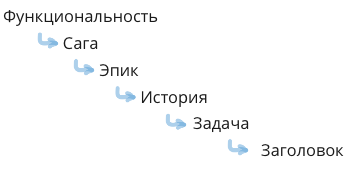Consultants and tool developers seem to have a tendency to make things complex. They think the harder we make things, the more our clients need us. And that's how tools and services are sold, I suppose.
On the other hand, I find unnecessary complexity extremely annoying. This is similar to the novel I read for the first time this week. It was good, but it contained too many minor characters that complicated the plot and made the book difficult to understand.
This situation occurs when people implement complex hierarchies or taxonomies for user stories like this:

You don't need this. When teams are forced to use complex taxonomies for their stories, they waste time worrying about whether a particular story is an epic, a saga, or just a title. This discussion is similar to the minor character that enters the novel and unnecessarily complicates the plot.
“But Mike,” I hear you asking, “you've written before about epics and themes.
Yes, but these are markings. “History is history,” so I recommend this taxonomy of stories:

Some stories are big and can be labeled as epics. I've already used the movie analogy. All films are films, but some films are romantic comedies - they are labeling, like epic.
Likewise, a topic indicates a group of related stories, but it should not operate within a hierarchy. Again, using films, I could have a spy film group that includes James Bond and Austin Powers films. But the comedy group would have included Austin Powers, but not James Bond.
So, again, topics and epics are labels, not an implied hierarchy. Don't make things more complicated than they should be. I have not seen any reason to have an intricate hierarchy or taxonomy of stories.